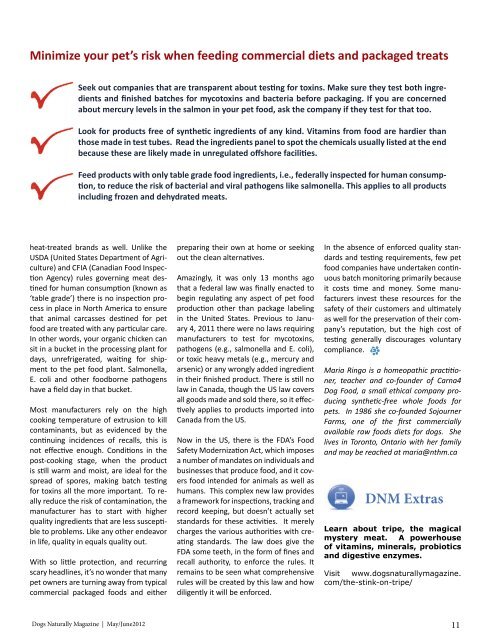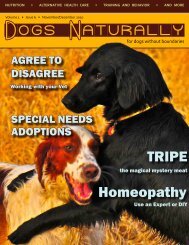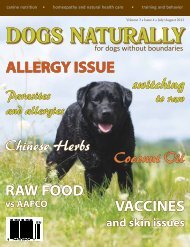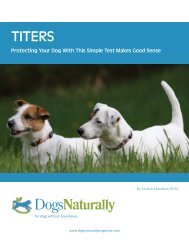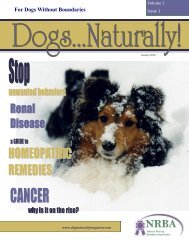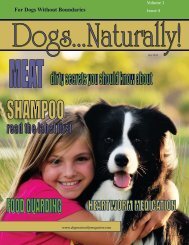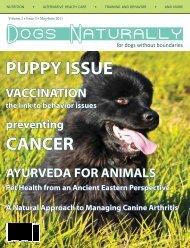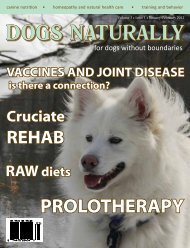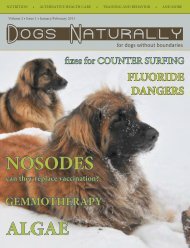Download the PDF Version - Dogs Naturally Magazine
Download the PDF Version - Dogs Naturally Magazine
Download the PDF Version - Dogs Naturally Magazine
You also want an ePaper? Increase the reach of your titles
YUMPU automatically turns print PDFs into web optimized ePapers that Google loves.
Minimize your pet’s risk when feeding commercial diets and packaged treats<br />
Seek out companies that are transparent about testing for toxins. Make sure <strong>the</strong>y test both ingredients<br />
and finished batches for mycotoxins and bacteria before packaging. If you are concerned<br />
about mercury levels in <strong>the</strong> salmon in your pet food, ask <strong>the</strong> company if <strong>the</strong>y test for that too.<br />
Look for products free of syn<strong>the</strong>tic ingredients of any kind. Vitamins from food are hardier than<br />
those made in test tubes. Read <strong>the</strong> ingredients panel to spot <strong>the</strong> chemicals usually listed at <strong>the</strong> end<br />
because <strong>the</strong>se are likely made in unregulated offshore facilities.<br />
Feed products with only table grade food ingredients, i.e., federally inspected for human consumption,<br />
to reduce <strong>the</strong> risk of bacterial and viral pathogens like salmonella. This applies to all products<br />
including frozen and dehydrated meats.<br />
heat-treated brands as well. Unlike <strong>the</strong><br />
USDA (United States Department of Agriculture)<br />
and CFIA (Canadian Food Inspection<br />
Agency) rules governing meat destined<br />
for human consumption (known as<br />
‘table grade’) <strong>the</strong>re is no inspection process<br />
in place in North America to ensure<br />
that animal carcasses destined for pet<br />
food are treated with any particular care.<br />
In o<strong>the</strong>r words, your organic chicken can<br />
sit in a bucket in <strong>the</strong> processing plant for<br />
days, unrefrigerated, waiting for shipment<br />
to <strong>the</strong> pet food plant. Salmonella,<br />
E. coli and o<strong>the</strong>r foodborne pathogens<br />
have a field day in that bucket.<br />
Most manufacturers rely on <strong>the</strong> high<br />
cooking temperature of extrusion to kill<br />
contaminants, but as evidenced by <strong>the</strong><br />
continuing incidences of recalls, this is<br />
not effective enough. Conditions in <strong>the</strong><br />
post-cooking stage, when <strong>the</strong> product<br />
is still warm and moist, are ideal for <strong>the</strong><br />
spread of spores, making batch testing<br />
for toxins all <strong>the</strong> more important. To really<br />
reduce <strong>the</strong> risk of contamination, <strong>the</strong><br />
manufacturer has to start with higher<br />
quality ingredients that are less susceptible<br />
to problems. Like any o<strong>the</strong>r endeavor<br />
in life, quality in equals quality out.<br />
With so little protection, and recurring<br />
scary headlines, it’s no wonder that many<br />
pet owners are turning away from typical<br />
commercial packaged foods and ei<strong>the</strong>r<br />
preparing <strong>the</strong>ir own at home or seeking<br />
out <strong>the</strong> clean alternatives.<br />
Amazingly, it was only 13 months ago<br />
that a federal law was finally enacted to<br />
begin regulating any aspect of pet food<br />
production o<strong>the</strong>r than package labeling<br />
in <strong>the</strong> United States. Previous to January<br />
4, 2011 <strong>the</strong>re were no laws requiring<br />
manufacturers to test for mycotoxins,<br />
pathogens (e.g., salmonella and E. coli),<br />
or toxic heavy metals (e.g., mercury and<br />
arsenic) or any wrongly added ingredient<br />
in <strong>the</strong>ir finished product. There is still no<br />
law in Canada, though <strong>the</strong> US law covers<br />
all goods made and sold <strong>the</strong>re, so it effectively<br />
applies to products imported into<br />
Canada from <strong>the</strong> US.<br />
Now in <strong>the</strong> US, <strong>the</strong>re is <strong>the</strong> FDA’s Food<br />
Safety Modernization Act, which imposes<br />
a number of mandates on individuals and<br />
businesses that produce food, and it covers<br />
food intended for animals as well as<br />
humans. This complex new law provides<br />
a framework for inspections, tracking and<br />
record keeping, but doesn’t actually set<br />
standards for <strong>the</strong>se activities. It merely<br />
charges <strong>the</strong> various authorities with creating<br />
standards. The law does give <strong>the</strong><br />
FDA some teeth, in <strong>the</strong> form of fines and<br />
recall authority, to enforce <strong>the</strong> rules. It<br />
remains to be seen what comprehensive<br />
rules will be created by this law and how<br />
diligently it will be enforced.<br />
In <strong>the</strong> absence of enforced quality standards<br />
and testing requirements, few pet<br />
food companies have undertaken continuous<br />
batch monitoring primarily because<br />
it costs time and money. Some manufacturers<br />
invest <strong>the</strong>se resources for <strong>the</strong><br />
safety of <strong>the</strong>ir customers and ultimately<br />
as well for <strong>the</strong> preservation of <strong>the</strong>ir company’s<br />
reputation, but <strong>the</strong> high cost of<br />
testing generally discourages voluntary<br />
compliance. f<br />
Maria Ringo is a homeopathic practitioner,<br />
teacher and co-founder of Carna4<br />
Dog Food, a small ethical company producing<br />
syn<strong>the</strong>tic-free whole foods for<br />
pets. In 1986 she co-founded Sojourner<br />
Farms, one of <strong>the</strong> first commercially<br />
available raw foods diets for dogs. She<br />
lives in Toronto, Ontario with her family<br />
and may be reached at maria@nthm.ca<br />
DNM Extras<br />
Learn about tripe, <strong>the</strong> magical<br />
mystery meat. A powerhouse<br />
of vitamins, minerals, probiotics<br />
and digestive enzymes.<br />
Visit www.dogsnaturallymagazine.<br />
com/<strong>the</strong>-stink-on-tripe/<br />
<strong>Dogs</strong> <strong>Naturally</strong> <strong>Magazine</strong> | May/June2012<br />
11


